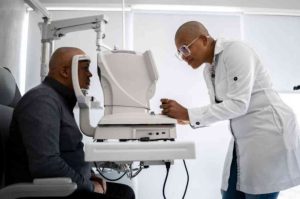Understanding the Importance of Early Detection in Eye Care
As we go through our daily lives, our eyes play a crucial role in helping us navigate the world around us. From reading a book to enjoying a scenic view, our vision is a fundamental part of our existence. It is essential to prioritize our eye health and understand the importance of early detection in maintaining optimal vision. Regular eye check-ups and consultations with eye specialists are key in preserving our eyesight and preventing potential complications. Let’s dive deeper into why early detection in eye care is so critical and how it can benefit our overall well-being.

Unlocking the Benefits of Regular Eye Check-ups
Regular eye check-ups are essential for maintaining good eye health and preserving your vision. Here are some of the key benefits of scheduling regular appointments with an eye specialist:
- Early detection: Regular eye check-ups can detect early signs of eye diseases before they progress, allowing for timely intervention and more effective treatment.
- Preventative measures: By monitoring changes in your vision through regular exams, preventative measures can be taken to maintain good eye health.
- Personalized care: An eye specialist can provide personalized care based on the results of a check-up, ensuring that you receive the appropriate treatment for your specific needs.
- Monitoring changes: Regular eye exams can help track changes in your vision and address any issues promptly, preventing further complications.

Empowering Your Vision with Advanced Technology
Advanced technology allows for more accurate and detailed eye examinations. Cutting-edge equipment can detect subtle changes in the eyes that may indicate potential problems. Technology-enabled diagnosis and treatment options can improve vision outcomes.
- Innovative tools can enhance the precision and effectiveness of eye care interventions
- Access to advanced technology can empower patients to take control of their eye health
Preventing Vision Loss Through Timely Intervention
Early intervention can prevent or delay the progression of vision loss. Timely treatment can preserve vision and quality of life in the long run. Regular screenings and early detection play a crucial role in preventing irreversible vision damage. Understanding the signs of eye problems can prompt timely intervention and prevent further complications. Prompt action can help maintain optimal eye health and prevent vision loss.

Choosing the Right Eye Care Center in Lekki
Researching and selecting a reputable eye care center is essential for quality treatment. Consider factors such as expertise, facilities, and patient reviews when choosing a center. Location and convenience should also be taken into account when selecting an eye care center.
A center with experienced eye specialists and modern equipment can ensure superior care. Personal recommendations and referrals can help in choosing the right eye care center in Lekki.
The Role of Eye Specialists in Preserving Your Eyesight
Eye specialists are trained to diagnose and treat a wide range of eye conditions. They possess the expertise and knowledge to provide specialized care and treatment options tailored to individual needs.
Regular consultations with an eye specialist can help monitor your eye health and detect any changes early on. This proactive approach can lead to more effective treatment and better outcomes for your vision.
Furthermore, eye specialists can offer guidance on maintaining good eye health and preventing vision problems. By trusting in the expertise of an eye specialist, you can preserve and enhance your eyesight for years to come.

Investing in Your Eye Health for a Brighter Future
Prioritizing regular eye care appointments is an investment in your long-term vision health. Taking proactive steps to maintain good eye health can prevent future issues and ensure optimal vision for years to come.
Investing in eye health now can lead to better vision and an improved quality of life in the future. Preventative measures and early detection through regular check-ups can save you from more serious eye problems down the line.
By committing to eye health now, you are taking steps towards a brighter and clearer future for your vision. Make the choice to invest in your eyesight today for a healthier tomorrow.

Conclusion
In conclusion, prioritizing early detection in eye care is paramount for maintaining optimal vision health. Regular eye check-ups, empowered by advanced technology, can detect issues early on and lead to more effective treatment outcomes. By choosing the right eye care center in Lekki and consulting with experienced eye specialists, you can take proactive steps to preserve your eyesight for a brighter future. Investing in your eye health now will not only benefit you in the present but also pave the way for clear and healthy vision in the long run. Remember, your eyes are precious – so make sure to prioritize their care and well-being.






